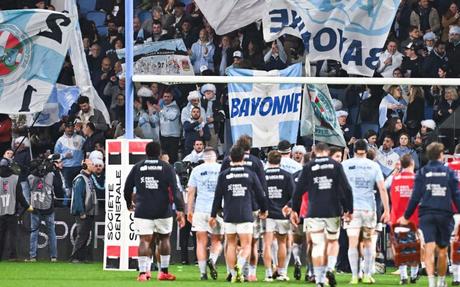
The appeal of French rugby clichés is enormous, but it is not what it once was. In the age of ultra-professionalism, the tales of biting and gouging have thankfully disappeared, the days of pre-match wine for the players are over and the concept of losing at home - once anathema to a city's residents - has become more bearable. in an increasingly globalized world. French rugby remains, compared to its rivals, the most culturally rich, wonderfully idiosyncratic and emotionally tribal - with the Top 14 and ProD2 the standard-bearers of global domestic rugby - but there is undoubtedly dilution compared to the ferocity and parochialism of French rugby. amateur era.
Yet there remains something almost indefinably attractive and mystical about French rugby - known in France as l'Ovalie - and about all my travels in this beautiful country - about the more than thirty cities and stadiums where I have played or watched - there is Nowhere there are so many that embody the true distillation of l'Ovalie as Bayonne does. Aviron Bayonnais - to give the club its full name - has for years been regarded as the little brother of neighboring Biarritz Olympique, without a significant domestic title since 1943, and has become a Basque colossus, the gold standard of a rugby city with an almost unparalleled dedication to their club; and so does the gold standard of the reverse. There is no Bayonnais billionaire, just a city full of fanatics, bursting with pride for both their city and their club.
Famous for its raucous summer festival and its delicious jambon and chocolate, Bayonne is a working town in southwestern France at the confluence of the Ardor and Nive rivers, seven kilometers inland from the Atlantic Ocean. Both on and off the pitch, Bayonne has spent considerable time in the shadow of neighboring Biarritz, the glamorous seaside town just a stone's throw away; but today Biarritz makes it in the second tier of French rugby - without making too much of a fist of it - while Bayonne flies the Basque flag as an established name in the Top 14. Since there are only six kilometers between the two stadiums, the rivalry between the two is fierce, bordering on toxic. On a recent visit, my second in six months, when asked for their opinion of Biarritz, one local said they didn't understand the question, another said they had never heard of it, while another blew a raspberry. You felt they were only half joking.
The story continues
Although not labeled Toulouse or Racing 92 as the heavyweights of the big-spending competition, Bayonne, even without a team full of superstars, trumps cities such as Castres, La Rochelle and Clermont-Ferrand when it comes to competition experience. This Basque city, full of boutiques, brasseries and bon vivants, is the lesser-known jewel in the crown of French rugby; the best place I have ever seen a domestic rugby match. Manu Tuilagi and perhaps Danny Care will be a surprise next season.


The reasons are endless. Let's start with Bayonne's crazy season. The concept of a home loss may have become more bearable among France's professional clubs, but Bayonne's Stade Jean-Dauger - the club's legendary stadium named after their famous center - is the embodiment of a French fortress. Bayonne is undefeated at home this season - including Toulouse and leaders Stade Français who have done well - but has not won a single match. Ninth out of 14 in the rankings and unbeaten on home soil, the last win a one-point nail-biter over European champions La Rochelle.
I had the privilege - given that tickets for one of Jean-Dauger's 14,370 seats are as rare as bad French cheese - to attend last Saturday's victory in La Rochelle with four friends, the latest iteration of the rugby road trip I wrote about in these pages last year. It was a cup final atmosphere, the match was even the talk of the town at 1pm on Saturday, ahead of the 9pm kick-off, with jerseys from both teams filling the streets. At lunch in the picturesque Dacquois in the city's cobbled centre, several fans passed by, decked out in club shirts, neckerchiefs or berets, on their way to the Vestiaire bar near the stadium, which was busy even seven hours before kick-off. The colors of Aviron Bayonnais are white and blue and if you cut the people of this city on match day they make them bleed.


"Geographically, we are lucky, with a club in the center of the city," said Bayonne president Philippe Tayeb. "That has led to an even greater marriage between the club and the fans. They are the best fans - because they are ours. They are there in good times and bad - and that is important. They are there when we win and they are there when we lose and that is so important for the players. They are so loyal."
Bayonne may not be as chic as neighboring Biarritz, but it is just as charming; the local Bayonnais people are among the most hospitable, hospitable and talkative people in all of France. A false compliment? Perhaps, but the Basques are a different race, an almost mystical race, whose origins are unknown, and are located on the border with Spain. For example, while soaking up the pre-match atmosphere in the courtyard of Des Basses Pyrénées, a Bayonne director overheard a conversation about our road trips and was so surprised by our commitment to the French rugby cause that he frog-marched us to the club shop around the corner and provided us each with a Bayonne jersey and a beret - free of charge. We of course offered to pay, but the director refused and I should add that he did not know at the time that I was a rugby writer. It was a remarkable display of generosity and rugby spirit.
And all this is before even mentioning La Peña Baiona, the club's chilling anthem that is sung before every match and has now, thanks to its uplifting melody and riotous chorus, become the unofficial anthem of the French team, at the top of its lungs heard during the match. every Les Bleus fixture.
How strange it is that the hymn of a certain club has evolved into the soundtrack of the national team. It's the equivalent of the Mighty Quin covering matches in England. In any case, due to geographical proximity, this would be more sensible, since Bayonne is 750 kilometers from Paris. "La Peña Baiona spans generations and cultures," says Tayeb. "It was such an honor to hear this become the anthem of last year's World Cup."
That's the Bayonne effect; a match that not only shook their great rivals Biarritz, but also created French rugby's biggest carnival.
